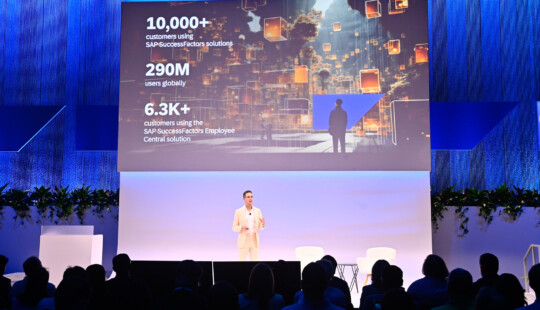What’s News
With the the fourth quarter rally ahead and the holidays nearing, workplace stress levels are climbing as employees return from fall business conferences, strive to meet year-end deadlines, balance family commitments, cope with economic uncertainty and endure an unending health crisis. For global knowledge workers, distributed teams across time zones can mean long hours of emails and video conferences, further compounding stress.
Research and people stories are gaining attention, like Rachel Feintzeig’s recent article in The Wall Street Journal, which suggests more rest may be the key to better health and improved productivity in the future of work.
SAP’s Take
Dr. Natalie Lotzmann, chief medical officer and global head of Health, Safety and Well-Being at SAP, believes that creating a healthy, caring culture in which people can thrive and live a fulfilling life in spite of a highly competitive environment ensures that our people run at their best. She counsels employees and people managers and promotes the value of healthy habits like preserving restorative rest.
What rest and recovery look like can vary from individual to individual. According to Lotzmann, recovery can be active, like playing sports, or passive, like sitting in the park. What is more important, she said, is that the person has a regular rhythm that involves periods of task-related concentration, offset by experiences that require a shift in focus to something that has a calming effect, like a walk outdoors, time with a pet or a yoga session.
“Everything that is in a healthy living balance has an underlying rhythm,” Lotzmann said. “It’s not important exactly what it is that you do. The most important thing is that there is a healthy rhythm.”
Micro-breaks are very short breaks that employees can take throughout the work day. As an example of a micro-break, Lotzmann said, “The easiest thing is just to stop, take a deep breath, and look out the window at something in nature. Consciously watch the trees bending in the wind or the birds flying by. Continue breathing and let your mind float. Reflect on what really matters to you in life. Be grateful for what you have. For most people, this is the perfect way to get distance, calm down and reset your brain.”
Research suggests that taking micro-breaks of 10 minutes can improve engagement and motivation. The longer the break, the greater the increase in performance. Micro-break activities may include stretching, nutritional intake like coffee — in moderation! — and a snack, or a social activity not centered on work-related topics. Less beneficial are cognitive activities like reading the news, surfing the web, online shopping or banking, which can leave people more depleted, especially under demanding workloads.
Benefits of Rest for Productivity
At SAP, the health management team champions rest as the key to supporting healthy distance. “Rest enables you to have healthy distance, to keep things into perspective and to reflect and recharge. You need healthy distance to make the best decisions possible,” Lotzmann said. “The more you are drawn into a stressful situation without that healthy distance to reflect, the higher the possibility that you will act toward a win-lose or even lose-lose outcome. In a state of healthy distance, you are in a position to realize what really matters, what it takes to resolve the situation toward a win-win outcome or how to turn the challenge into an opportunity.”
An unspectacular example of where healthy distance is useful — and that is likely to be familiar to knowledge workers — is the email chain conversation with many people on copy that takes a sharply negative turn. Lotzmann said that without healthy distance, an automated reflexive reaction of cause and effect leading to escalation is more likely to happen. However, after a moment of restorative rest to gain healthy distance, people are more likely to respond thoughtfully and achieve better outcomes for all. The distance allows us to realize the big picture, to step into the shoes of a participant or to think about the right person to talk to before taking reflected action.
A healthy and balanced mindset allows targeted action toward the best possible outcome for all.
Micro-Breaks, Supported by Technology
To support organizational health and business agility, an organization has a responsibility to empower employees and enable them to take care of themselves. Workplace culture plays an important role in encouraging people to create balance in their lives. However, people will not take time for rest if they believe they will be punished, consciously or unconsciously.
A new crop of workplace technologies is helping employees, many of whom work remotely, to integrate micro-breaks into their day in a way that encourages building healthy habits. SAP recently launched a global pilot project to introduce micro-breaks supported by technology that integrates into its online collaboration platform. For those preferring mindfulness, guided meditations by SAP’s own mindfulness trainers are available both as regular sessions as well as via a well-known app on demand.
“My advice is to try it out and decide if it is helpful for you,” suggested Lotzmann, who understands that technology-based prompts may not appeal to some employees. She also has another food for thought, “As we are human beings — and social beings — the most powerful reminders for breaks are other people.” She said that if you can include family, friends or colleagues into your taking-a-break-habits like going for a walk together, participating in a virtual yoga class together or simply reminding each other to take a break and have a chat — most people can build healthy habits more easily in togetherness.
“For many people, this is a great key to do it right,” she added. “The more we talk about taking meaningful breaks and share how we take them, the more likely it is that it really becomes a personal healthy habit in an overall healthy corporate culture.”
Contact:
Ilaina Jonas, Senior Director of Global Public Relations, SAP
+1 (646) 923-2834, ilaina.jonas@sap.com



